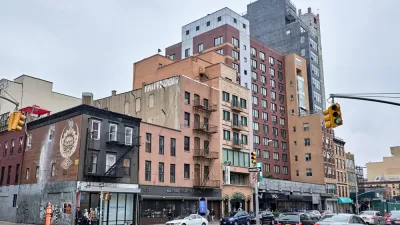A new report presents five strategies for overcoming the long-term effects of systemic racism as perpetuated by housing and planning policies of the past and present.

The Othering and Belonging Institute at the University of California, Berkeley has published a series of research briefs on the effects of racial segregation in the San Francisco Bay Area, publishing the fifth in the series on August 11, 2020.
"Our main purpose in this series has been to raise public awareness about the degree of segregation that persists in the Bay Area and the harmful effects that result from it," according to a website that shares all five of the briefs and all addenda.
"This five-part series investigates the persistent problem of racial residential segregation in the San Francisco Bay Area by applying novel research methods and fresh analytical tools to better understand the extent and nature of the problem."
Included among the briefs is a new interactive online tool to illustrate "various measures of segregation and directly observe changes in the level of segregation with each measure over time."
The most recent, fifth, installation of the series focuses on solutions, remedies and targets, presenting "five general policy approaches that can help address the problem of racial residential segregation and help put the Bay Area on a better path forward."
Those five policy recommendations are listed as follows, with a lot more detail provided both on the website and in the brief:
- Curtail restrictive land use policies and regulations and open up exclusionary neighborhoods and communities to different-race peoples.
- Implement rent control and rent stabilization policies to prevent displacement from integrated or integrating communities or to keep integration sustainable where it exists.
- Implement mobility strategies to support people who wish to move to neighborhoods where members of a different race predominate, and thereby reduce the segregation of those communities.
- Expand inclusionary zoning ordinances and statewide fair share laws that mandate a specific level of economic integration.
- Implement affordable housing policies and other direct subsidies that permit a larger range of housing options can have a pro-integrative effect.
According to the Othering and Belonging Institute, improved affordability, as achieved by some of the proposals included here, would have benefits for a greater share of the population than just those considered low-income or very low-income.
FULL STORY: Racial Segregation in the San Francisco Bay Area, Part 5

Planetizen Federal Action Tracker
A weekly monitor of how Trump’s orders and actions are impacting planners and planning in America.

Map: Where Senate Republicans Want to Sell Your Public Lands
For public land advocates, the Senate Republicans’ proposal to sell millions of acres of public land in the West is “the biggest fight of their careers.”

Restaurant Patios Were a Pandemic Win — Why Were They so Hard to Keep?
Social distancing requirements and changes in travel patterns prompted cities to pilot new uses for street and sidewalk space. Then it got complicated.

Platform Pilsner: Vancouver Transit Agency Releases... a Beer?
TransLink will receive a portion of every sale of the four-pack.

Toronto Weighs Cheaper Transit, Parking Hikes for Major Events
Special event rates would take effect during large festivals, sports games and concerts to ‘discourage driving, manage congestion and free up space for transit.”

Berlin to Consider Car-Free Zone Larger Than Manhattan
The area bound by the 22-mile Ringbahn would still allow 12 uses of a private automobile per year per person, and several other exemptions.
Urban Design for Planners 1: Software Tools
This six-course series explores essential urban design concepts using open source software and equips planners with the tools they need to participate fully in the urban design process.
Planning for Universal Design
Learn the tools for implementing Universal Design in planning regulations.
Heyer Gruel & Associates PA
JM Goldson LLC
Custer County Colorado
City of Camden Redevelopment Agency
City of Astoria
Transportation Research & Education Center (TREC) at Portland State University
Camden Redevelopment Agency
City of Claremont
Municipality of Princeton (NJ)





























